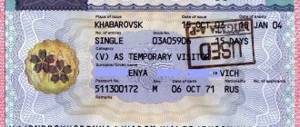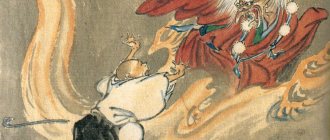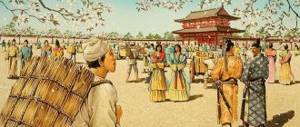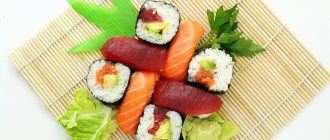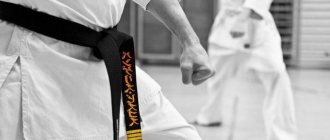It seems that when the Japanese want to do something, they go the “total immersion” route, buying the latest gear and equipment so that they can look like seasoned professionals before their first and perhaps only lesson. This usually reflects the manifestation of the important Japanese concept of katachi (form), the rough equivalent of which is the formula “It’s not what you do, but how you do it.” It is not uncommon to see Japanese people of any age standing on a platform waiting for a train or in front of a building on the street, doing stretches with an imaginary golf club in their hands. One of the latest hobbies of young Japanese women is mountain climbing, naturally in fashionable gear.
Peculiarities
In Japan, there is a special government program aimed at promoting sports and a healthy lifestyle. Schoolchildren and students are required to attend physical education classes, and adults go to gyms, sports grounds, and do fitness. Every year on the second Monday of October, National Health Day is celebrated - mass sporting events, gymnastics, and exercises are held throughout the country.
Physical Education Day in Japan
Japan is strongly associated with martial arts. They have a long history here. Martial arts as types of wrestling began to stand out in the Kamakura era, that is, from the end of the 12th to the first half of the 14th century.
Thus, the Land of the Rising Sun laid the foundation for many sports that later became popular throughout the world: aikido, judo, kendo. Kyujutsu, the art of wielding a bow, became an important activity for samurai.
The so-called inoimono - hunting with dogs - was also important. But sumo deserves special attention - this is the most important national sport according to the professional sumo association.
Japan actively participates in global sporting events, and the Summer Olympic and Paralympic Games in 2021 will be held in Tokyo. Let us also remember that 2021 was the year of Japan in Russia, and throughout the year Japanese delegations came to our country, organizing performances and master classes in national sports.
So, for example, the most active sports participant was the Japanese martial arts house Nippon Budokan. There were also performances by athletes in yabusame - horse-mounted archery.
There are other sports that are practically unknown in the rest of the world, but popular in Japan:
- Fukia is a direction in darts where athletes shoot from a blowgun.
- Gateball is a type of croquet.
- Japanese kickboxing is a type of kickboxing based on the rules of taibo, but with different principles of counting and does not allow hitting with elbows.
- Spochan is a type of fencing sport using various types of edged weapons.
The most intellectual sport
Every year the Japanese Poker Championship gathers its fans in Tokyo. The Japan Open has been held every year since 2011, and each time it becomes a highlight of the country's sporting life. This is the main poker tournament, which admits the best world-class poker athletes who have passed a number of qualifying tournaments, which are held both in person and online under the patronage of the largest poker room PokerStars. Poker experts and fans flock to Tokyo to cheer on their favorites and take part in competitions.
National treasure
Speaking about the national sport, of course, it is necessary to dwell in more detail on sumo. It is interesting that initially it was not so much a sporting competition as a religious rite of the Shinto tradition, held in temples. It could also be associated with beliefs: if, for example, a peasant and a fisherman competed, and the first one won, then this meant that a fruitful year was ahead.
Sumo as an independent wrestling arose back in the 8th century. There is a belief that people inherited it from the gods: it was according to these rules that the gods fought among themselves in the struggle for island territories.
The fight takes place between two fighters. They compete in a special round ring, which is located about a meter high. The diameter of the circle is always the same - 455 centimeters.
The ring is made of special clay; it is also covered with tatami or sprinkled with sand to make it easier to adhere to the surface, as well as to quickly determine the loser. The rules are simple: the loser is the one who first touches the floor with any part of the body other than the feet, or goes outside the ring. During a fight, you cannot hit the nose, ears, eyes, genitals, choke, grab hair, or hit with fists.
In sumo there is an extensive vocabulary of terms, grip techniques, strategic and tactical lines of behavior. There are a lot of rules that have remained traditional for centuries. These include clothing: judges still dress in the kimonos of nobles at court who lived in the 14th century.
Sumo referee clothing
The wrestlers' clothing is also strictly regulated: they only wear a special nine-meter belt, 80 cm wide. This belt is wrapped around the stomach and between the legs in a special way, and the knot is located behind the back. Wrestlers are also known for their characteristic ponytail hairstyles, which also have a practical purpose - they protect the head in case of a fall.
Another feature of athletes is their heavy weight, which sometimes reaches 250 kilograms. Each weight has advantages and disadvantages: let’s say, in addition to the obvious advantages, a heavier fighter has a main disadvantage - less agility and flexibility. To become a professional, a sumo wrestler needs more than one year of intense training in harsh conditions.
Sumo has long spread throughout the world. More and more new directions of this sport are appearing, and even girls are becoming fighters. However, the Japanese themselves are very conservative in this regard - only men are allowed into the ring, as many years ago.
Only in the Land of the Rising Sun can sumo competitions be considered professional - in all other countries amateur athletes compete.
Aikido
Translated from Japanese - the path of merging with vital energy. It was created by Morihei Ueshiba as a synthesis of martial art, philosophy and religious beliefs. The goal of aikido is not just to protect oneself, but also to protect the attacker from injury. His techniques are based on merging with the enemy's attack, redirecting the attacker's energy, throws and painful holds.
The key moment in the birth of aikido was 1920. It was very dramatic and even tragic for Morihei Ueshiba: his father and young sons died. The inconsolable man began to seek solace in the spiritual practices of the teachings of Oomoto-ke, which later greatly influenced the philosophical component of aikido.
It is a mistake to interpret aikido solely as a fighting art. It has its own interesting philosophy and even a religious component.
The purpose of the fight is not to kill or maim the offender, but to stop the one who raised his hand against you without causing any harm to his life and health. Aikido teaches unity, helping one's neighbor, and love for other people.
During an attack, the Aikido master uses the aggression of the offender against himself, while remaining in complete spiritual and physical balance. An attack is interpreted as aggression leading to disharmony, and defense is an escape or throw that takes advantage of the attacker’s anger. As a result, internal harmony is not disturbed by anything, the enemy lost, harmony was not damaged. In essence, the master forces the attacker to abandon his idea.
Basic principles of Aikido:
- Aiki spirit of unity.
- Ma-ay safety distance.
- Leaving the Tai Sabaki attack line.
- Kuzushi is the conclusion of the opponent of their balance.
- Spiral movements, using the center – Sumi.
- Atemi striking technique.
Other types of wrestling
At the same time, Japan is the birthplace of other martial arts besides sumo:
- Judo - the main technique of this fight is that the fighter uses the force and energy of the opponent’s blow to his advantage. Judo is included in the list of Olympic sports. The largest: students train here and professionals perform.
- Kendo is fencing with bamboo swords. In this case, opponents are dressed in specially protected clothing made of cotton or varnished material. The citadel of kendo masters is Tokyo's Budokan Hall.
- Karate - invented by Okinawan peasants who were forbidden to carry weapons, this sport is now known throughout the planet. The practice is based on the concentration of force - to such an extent that true masters are able to destroy bricks or boards stacked in a column with their hands or feet. Karate achieved particular popularity only in the early 1920s thanks to the recognized fighter Motobu Teki.
- Aikido - during a fight, opponents also concentrate their strength and try to use the opponent’s strength to their own advantage. People who practice aikido consider it primarily an excellent means of maintaining excellent shape.
- Kyudo is a meditative archery practice aimed not only at defeating an opponent, but also at one’s own self-improvement on a spiritual level. Kyudo is sometimes called “standing Zen.”
Sport climbing
It just so happens that in the four previous newcomers to the Olympic program, we have very little chance of medals. Our representatives are only in karate. And then there is only hope for Anna Chernysheva. But climbing is a completely different story.
Russia hosts many serious professional sport climbing tournaments and will be represented at the Olympics by three athletes (with a maximum license of four people per country). Alexey Rubtsov, Yulia Kalina and Valeria Meshkova will compete for medals.
The medal draw will take place in two disciplines - men's and women's all-around. A total of two sets of medals will be awarded.
And we will follow the successes of our climbers. Moreover, there is something to see. Sport climbing is an incredibly exciting sport. The competition starts on August 3 at the Aomi City Sports Park.
Modernity
But the Japanese are not engaged in just one fight - this is proven by both official statistics and real facts. The answers to the question about the most popular and favorite sport among local residents may surprise the reader. Here's what's popular among the Japanese:
- baseball – 52%;
- football – 23%
- sumo – 19%;
- golf – 15%;
- boxing – 10%;
- motorcycle racing – 9%;
- wrestling – 7% (the rest of the respondents chose another sport or found it difficult to answer).
Golf leads the way in terms of the number of newly registered athletes - both men and women - followed by cycling and boxing.
In modern Japan, there really is a real baseball cult - it came here from the USA, and now almost every resident has a favorite and native team. In the summer and spring there is a championship between university students, and in professional sports there are twelve teams, the recognized leaders among which are the Hanshin Tigers and the Yomiuri Giants.
Hanshin Tigers
Football in the Land of the Rising Sun is also no less popular than at home, in Europe. Back in the 6th century, there was a similar game here called “kemari”. And football in the usual sense came here in 1873 thanks to the British naval captain Douglas - he showed it to the students of the Naval Academy in Tokyo, and they liked it. Already in 1904, the first international game took place between Japanese students and foreigners temporarily living on the islands.
The J. League was founded in 1993, and now it has 28 teams. Every time Japan participates quite successfully in the World Cup, and the World Cup in Russia in 2021 was no exception.
Another European activity that is so loved by Japanese athletes is golf. Japan ranks second after the United States in terms of the number of golf courses in the world.
In recent years, winter sports have also become increasingly popular: alpine skiing, skating, and snowboarding. There are more and more ski resorts and skating rinks in northern Honshu and on the island of Hokkaido, and they attract thousands of people, both professionals and amateurs.
Jiu-jitsu
Literally translated from Japanese as the art of gentleness. This is a hand-to-hand combat technique, the basis of which is a supple technique of movement. Jiu-jitsu originated in the 16th century.
Its appearance is associated with the name of the ruler of the Mimasaka province, Hisamori Takenuoti, who managed to combine different types of martial arts used in close combat, when weapons turn out to be completely ineffective.
The main principle of this ancient fighting technique is not direct confrontation with the enemy. You need to yield to the attacker’s pressure, as if directing his actions to the side, until he lures himself into a trap, turning the pressure and force against him.
This principle has a connection with the semi-legendary Japanese healer Shirobei Akayama, who noticed that during a storm, massive oak branches broke, but willow twigs, which succumbed to the elements, survived. Inspired by this phenomenon, he founded the first school of jujitsu.
The philosophical basis of this martial art is that human life, like a fortress, is strengthened by four walls, which are equally important:
- Spirituality.
- Health.
- Communication with others.
- Knowledge and work.
If one of these walls is weak, then a person’s life can collapse at any moment, like a house of cards. Therefore, it is advisable to work on the four walls of the fortress of the spirit from childhood. It is very important that the child has a solid foundation before entering independent life.
Kudo
This modern full-contact martial arts was created relatively recently - in 1981 by Azuma Takashi, who used knowledge of Kyokushinkai karate, judo wrestling and Muay Thai. Translated from Japanese as “the path of the open heart” or “the path in the void.”
It is a mistake to believe that kudo is karate. Many people think so, but in fact it is a completely different sport, with its own rules, training system, occupying its own niche in the martial arts system. The main difference between kudo and karate is the complete absence of kata. Instead, they practice practicing strikes, combinations, wrestling and throwing techniques. As a rule, paired with a partner. Makiwaras are often used in kudo.
Links
- SPORT // Japan from A to Z. Popular illustrated encyclopedia. (CD-ROM). - M.: Directmedia Publishing, "Japan Today", 2008. - ISBN 978-5-94865-190-3.
This is a draft article about Japan. You can help the project by adding to it. This is a draft article about sports. You can help the project by adding to it.
Competition calendar
1st day of the Olympics, July 24:
2:30 – 10:30. Bullet shooting. Men, pistol, 10 m. Women, rifle, 10 m.
5:00 – 12:15. Cycling, highway. Men.
7:50 – 10:00. Weightlifting. Women – 49 kg.
8:15 – 11:25. Archery. Mixed teams.
11:00 – 13:40. Judo. Men – 60 kg. Women – 48 kg.
12:00 – 16:25. Fencing. Men's saber, ind. Women's sword, ind.
13:00 – 16:40. Taekwondo. Men – 58 kg. Women – 49 kg.
2nd day of the Olympics, July 25:
3:00 – 10:30. Bullet shooting. Men's rifle, 10 m. Women's pistol, 10 m.
3:00 – 7:55. Skateboarding. Men, street.
4:30 – 6:20. Swimming. Men – 400 m high/s, 400 m medley. Women – 400 m medley, 4x100 h/s.
7:00 – 11:35. Cycling, highway. Women.
7:45 – 11:25. Archery. Women's teams.
9:00 – 10:00. Diving. Synchro, 3m, women.
9:50 – 12:00. Weightlifting. Men – 61 kg.
11:00 – 13:40. Judo. Men – 66 kg. Women – 52 kg.
12:00 – 16:25. Fencing. Men's sword, ind. Women's rapier, ind.
13:00 – 16:40. Taekwondo. Men – 68 kg. Women – 57 kg.
13:50 – 16:00. Weightlifting. Men – 67 kg.
3rd day of the Olympics, July 26:
0:30 – 3:00. Triathlon. Men.
3:00 – 11:15. Skeet shooting. Skeet - men, women.
3:00 – 7:55. Skateboarding. Women, street.
4:30 – 6:40. Swimming. Men – 100m breaststroke, 4x100h/s. Women – 100 m butt, 400 m h/s.
7:45 – 11:25. Archery. Men's teams.
8:00 – 10:45. Kayaking and canoeing. S-1 slalom, men.
9:00 – 11:00. Cycling, mountain biking. Men.
9:00 – 10:00. Diving. Men's synchronized 10m.
11:00 – 13:40. Judo. Men – 73 kg. Women – 57 kg.
12:00 – 16:25. Fencing. Men's rapier, ind. Women's saber, ind.
13:00 – 16:00. Gymnastics. Team all-around, men.
13:00 – 16:40. Taekwondo. Men – 80 kg. Women – 67 kg.
13:50 – 16:00. Weightlifting. Women – 55 kg.
14:00 – 16:10. Table tennis. Mixed couples.
4th day of the Olympics, July 27:
0:30 – 3:10. Triathlon. Women.
2:30 – 6:00. Rowing. Men - quadruple sculls. Women - quadruple sculls.
3:00 – 10:30. Bullet shooting. Mixed teams - pistol, 10m rifle, 10m.
4:30 – 6:25. Swimming. Men – 200 m high/s, 100 m back. Women - 100m back, 100m breaststroke.
8:00 – 11:00. Kayaking and canoeing. K-1 slalom, women.
9:00 – 11:00. Cycling, mountain biking. Women.
9:00 – 10:00. Diving. Synchro, 10m, women.
9:50 – 12:00. Weightlifting. Women – 59 kg.
11:00 – 13:40. Judo. Men - 81 kg. Women – 63 kg.
11:30 – 16:40. Horseback Riding. Team dressage.
12:30 – 14:40. Fencing. Women's sword, team.
13:00 – 16:40. Taekwondo. Men – more than 80 kg. Women – more than 67 kg.
13:45 – 16:00. Gymnastics. Team all-around, women.
13:50 – 16:00. Weightlifting. Women – 64 kg.
5th day of the Olympics, July 28:
2:00 – 5.35. Surfing. Men, women.
2:30 – 6.00. Rowing. Men - double sculls, quadruple sculls. Women - double sculls, quadruple sculls.
4:30 – 7.05. Swimming. Men – 200 m butt, 4x200 m high/s. Women – 200 m/s, 200 m medley, 1500/s.
5:30 – 11:40. Cycling, processing. Men women.
9:00 – 10:00. Diving. Synchro, 3 m, men.
10:30 – 13:00. Rugby 7. Men's final.
11:00 – 13:40. Judo. Men – 90 kg. Women – 70 kg.
11:30 – 15:25. Horseback Riding. Individual dressage.
12:30 – 14:40. Fencing. Men's saber, team.
13:15 – 16:00. Gymnastics. Individual all-around, men.
13:50 – 16:00. Weightlifting. Men – 73 kg.
14:45 – 17:25. Basketball 3x3. Men's and women's finals.
6th day of the Olympics, July 29:
2:30 – 6:00. Rowing. Men's double scull, easy double scull. Women – double, double scull easy.
3:00 – 11:00. Skeet shooting. Ladder - men, women.
4:30 – 6:20. Swimming. Men – 800 m h/s, 200 m h/s, 100 m h/s. Women – 200 m baht, 4x200 v/s.
8:00 – 10:45. Kayaking and canoeing. S-1 slalom, women.
11:00 – 13:40. Judo. Men – 100 kg. Women – 78 kg.
12:30 – 14:30. Fencing. Women's foil, team.
13:50 – 16:00. Gymnastics. Individual all-around, women.
14:00 – 16:10. Table tennis. Women's singles.
7th day of the Olympics, July 30:
2:45 – 4:55. Rowing. Men - singles, eights. Women - singles, eights.
3:00 – 9:00. Bullet shooting. Women's pistol, 25 m.
4:00 – 6:20. Cycling, BMX. Beach Soccer. Men women.
4:30 – 6:10. Swimming. Men – 200m back, 200m medley. Women – 200m breaststroke, 100m H/S.
6:00 – 14:00. Tennis. Men's doubles final.
7:00 – 9:25. Trampoline. Women, ind.
8:00 – 11:00. Kayaking and canoeing. K-1 slalom, men.
8:45 – 11:20. Archery. Women's individual tournament.
9:30 – 15:30. Beach Soccer. Mixed couples.
11:00 – 13:40. Judo. Men - more than 100 kg. Women – more than 78 kg.
12:30 – 14:40. Fencing. Men's sword, team.
13:00 – Athletics. Men - 10,000 m.
14:00 – 16:10. Table tennis. Men's singles.
8th day of the Olympics, July 31:
1:30 – 3:25. Triathlon. Mixed relay.
3:00 – 8:50. Skeet shooting. Mixed teams, ladder.
4:30 – 6:20. Swimming. Men - 100m butt. Women – 200 m back, 800 m high/s. Mixed 4x100m relay.
6:00 – 12:00. Sailing. Medal races in RS: X - men and women.
6:00 – 11:10. Bullet shooting. Women's rifle, 50m three positions.
6:00 – 14:00. Tennis. Women's singles. The final.
7:00 – 9:25. Trampoline. Men, ind.
8:45 – 11:20. Archery. Men's individual tournament.
9:50 – 12:00. Weightlifting. Men - 81 kg.
10:30 – 13:00. Rugby 7s women's final.
11:00 – 13:40. Judo. Mixed team tournament.
12:00 – 17:00. Badminton, men's doubles.
12:30 – 14:40. Fencing. Women's saber, team.
13:00 – Athletics. Men - disc. Women - 100 m. Mixed relay 4x400 m.
13:50 – 16:00. Weightlifting. Men – 96 kg.
9th day of the Olympics, August 1:
1:30 – 10:00. Golf. Individual championship, men.
3:00 – Athletics. Women are the core.
4:30 – 6:25. Swimming. Men – 50 m high/s, 1500 m high/s, 4x100 complex. Women – 50 m/s, 4x100 complex.
4:10 – 6:45. Cycling, BMX. Freestyle. Men, women.
6:00 – 14:00. Tennis. Men's singles final. Women's doubles final. Mixed doubles final.
6:00 – 12:00. Sailing. Medal races in Laser - men and women.
9:00 – 10:30. Diving. Women's 3m individual jumps.
11:00 – 14:00. Gymnastics. Men - floor exercise, pommel horse. Women - vault, uneven bars.
12:30 – 15:20. Fencing. Men's foil, team.
13:00 – Athletics. Men – 100 m, height. Women's triple jump.
13:50 – 16:00. Weightlifting. Women – 76 kg.
14:30 – 17:00. Badminton. Women.
10th day of the Olympics, August 2:
2:30 – Bullet shooting. Men's rifle 50m three positions. Men, pistol, 25 m.
3:00 – Athletics. Men - long jump. Women – 100 m/b.
6:00 – 12:00. Sailing. Medal races in 49er - men and women.
7:00 – 9:30. Badminton, women's doubles.
9:30 – 12:30. Cycling, track. Women's team sprint.
9:50 – 12:00. Weightlifting. Women – 87 kg.
11:00 – 13:15. Gymnastics. Men - vault, rings. Women - floor exercise.
11:30 – 15:40. Horseback Riding. Eventing, individual and team championships.
12:15 – 16:00. Sports wrestling. Women's wrestling – 76 kg. Greco-Roman wrestling – 60 kg, 130 kg.
13:00 – Athletics. Men – 3000 m/b. Women - 5000 m, disc.
13:50 – 16:00. Weightlifting. Women – more than 87 kg.
14:00 – 17:00. Badminton. Men.
11th day of the Olympics, August 3:
3:00 – Athletics. Men – 400 m/b. Women - length
3:30 – 7:15. Kayaking and canoeing. Men – K-1 1000 m, S-2 1000 m. Women – K-1200 m, K-2500 m.
7:00 – 8:30. Boxing. Women, 57 kg.
8:30 – 10:55. Sailing. Medal races in Finn for men and Nacra 17.
9:00 – 10:30. Diving. Men's 3m individual jumps.
9:30 – 12:10. Cycling, track. Man team sprint, women's pursuit.
11:00 – 13:40. Boxing. Men, 69 kg.
11:00 – 13:15. Gymnastics. Men - parallel bars, horizontal bar. Women are logs.
12:15 – 16:00. Sports wrestling. Women's wrestling – 68 kg. Greco-Roman wrestling – 77 kg, 97 kg.
13:00 – Athletics. Men - pole. Women - 200 m, 800 m, hammer.
13:50 – 16:00. Weightlifting. Men – 109 kg.
12th day of the Olympics, August 4:
0:30 – 3:10. Swimming. Women's marathon, 10 km.
3:00 – Athletics. Women – 400 m/b
3:00 – 7:40. Skateboarding. Women, park
8:00 – 10:00. Boxing. Men, 81 kg.
8:30 – 10:55. Sailing. Medal races in 470 - men and women.
9:30 – 13:00. Cycling, track. Men's pursuit race.
12:15 – 16:00. Sports wrestling. Women's wrestling – 62 kg. Greco-Roman wrestling – 67 kg, 87 kg.
12:30 – Athletics. Men - 200 m, 800 m, hammer. Women – 3000 m/b.
13:00 – 15:40. Horseback Riding. Show jumping, personal competitions.
13:30 – 15:00. Artistic swimming. Duet.
13:50 – 16:00. Weightlifting. Men - more than 109 kg.
13th day of the Olympics, August 5:
0:30 – 3:10. Swimming. Men's marathon, 10 km.
3:00 – Athletics. Men – 100 m/b, 20 km walk, triple jump, shot.
3:00 – 7:40. Skateboarding. Men, park.
3:30 – 7:15. Kayaking and canoeing. Men – K-1200 m, K-21000 m. Women – S-1200 m, K-1500 m.
8:00 – 10:00. Boxing. Men, 57 kg.
9:00 – 10:30. Diving. Women's 10m individual jumps.
9:30 – 12:50. Cycling, track. Male omnium, female keying.
11:00 – 15:40. Karate. Women's kata. Kumite men up to 67 kg, women up to 55 kg.
11:30 – 16:20. Rock climbing. Harvester, men.
12:15 – 16:00. Sports wrestling. Women's wrestling – 57 kg, 86 kg.
13:00 – Athletics. Men - 400 m, decathlon. Women – 20 km walk, heptathlon.
13:00 – 15:10. Field hockey. Men's final.
13:30 – 16:40. Table tennis. Women's team tournament.
14th day of the Olympics, August 6:
3:00 – Athletics. Men – walk 50 km.
4:00 – 6:50. Beach volleyball. Women's final.
5:00 – 7:00. Football. Women's final.
8:00 – 9:40. Boxing. Men, 91 kg.
8:30 – 14:15. Modern pentathlon. Women.
9:30 – 12:30. Cycling, track. Men's sprint, women's Madison.
11:00 – 15:40. Karate. Men's kata. Kumite men up to 75 kg, women up to 61 kg.
11:30 – 16:20. Rock climbing. Harvester, women.
12:15 – 16:00. Sports wrestling. Women's wrestling – 53 kg. Freestyle wrestling – 74 kg, 125 kg.
13:00 – Athletics. Men - 5000 m, 4x100 relay. Women – 400 m, 1500 m, 4x100 relay, javelin, pole.
13:00 – 15:10. Field hockey. Women's final.
13:30 – 16:40. Table tennis. Men's team tournament.
15th day of the Olympics, August 7:
1:30 – 10:00. Golf. Individual championship, women.
3:00 – Athletics. Marathon, women.
3:30 – 7:15. Kayaking and canoeing. Men – S-1 1000 m, K-4500 m. Women – S-2500 m, K-4500 m.
4:00 – 6:50. Beach volleyball. Men's final.
5:30 – 7:30. Boxing. Men's final.
8:00 – 10:00. Boxing. The final. Men, 52 kg, 75 kg. Women, 51 kg, 69 kg.
8:00 – 14:35. Karate. Kumite men over 75 kg, women over 61 kg.
8:30 – 14:15. Modern pentathlon. Men.
9:00 – 10:30. Diving. Men's 10m individual jumps.
9:20 – 12:00. Gymnastics. Individual all-around.
9:30 – 12:30. Cycling, track. Men's Madison.
10:30 – 12:20. Water polo. Women's final.
12:15 – 16:00. Sports wrestling. Women's wrestling – 50 kg. Freestyle wrestling – 65 kg, 97 kg.
12:50 – Athletics. Men – 1500 m, 4x400 m relay, javelin. Women - 10000 m, 4x400 m relay, height.
13:00 – 15:20. Horseback Riding. Team competition.
13:00 – 16:30. Baseball.
13:30 – 15:00. Artistic swimming. Team.
14:30 – 16:30. Football. Men's final.
15:00 – 17:30. Handball. Men's final.
15:15 – 17:45. Volleyball. Men's final.
16th day of the Olympics, August 8:
3:00 – Athletics. Marathon, men.
4:00 – 7:15. Cycling, track. Men's keirin, women's sprint, women's omnium.
5:00 – 6:55. Gymnastics. Group all-around.
5:30 – 8:00. Volleyball. Women's final.
7:30 – 10:00. Volleyball. Women's final.
8:00 – 10:00. Boxing. Men – 63 kg, over 90 kg. Women – 60 kg, 75 kg.
9:00 – 11:30. Handball. Women's final.
10:30 – 12:20. Water polo. Men's final.
to contents


